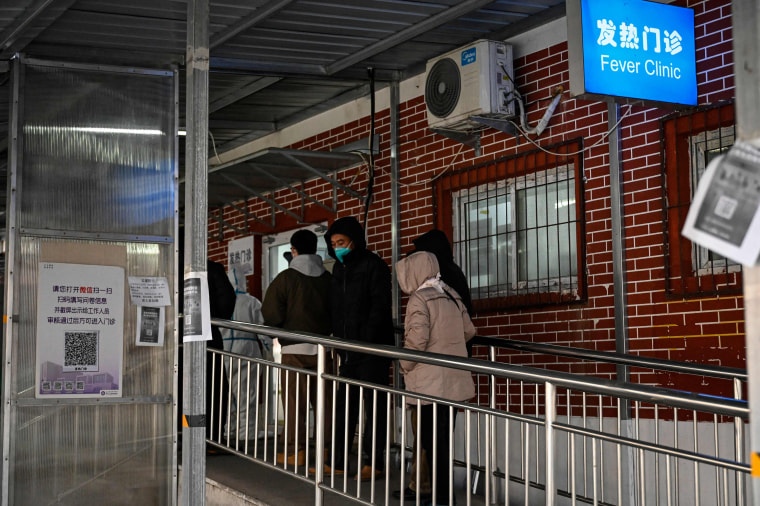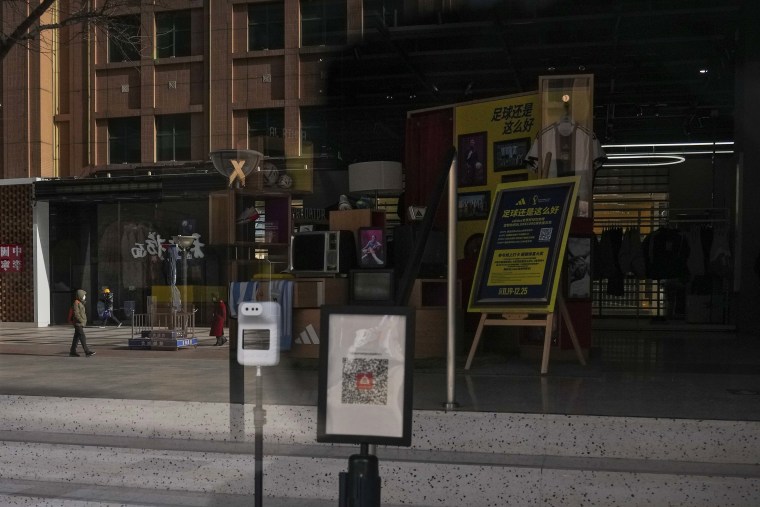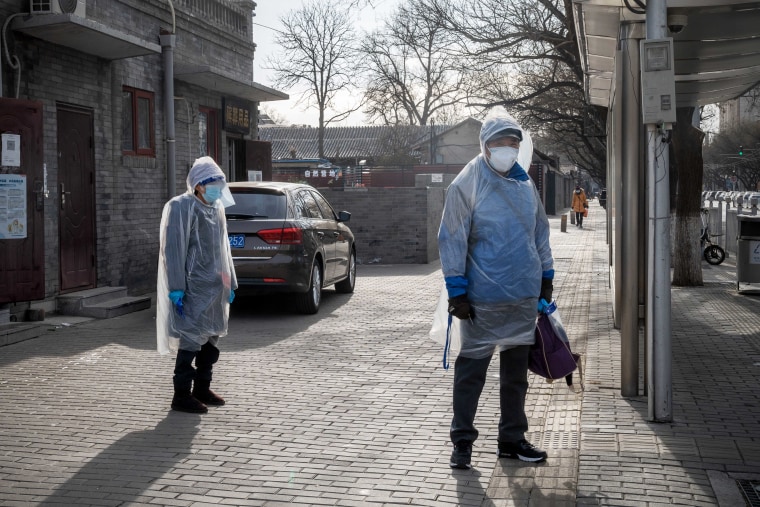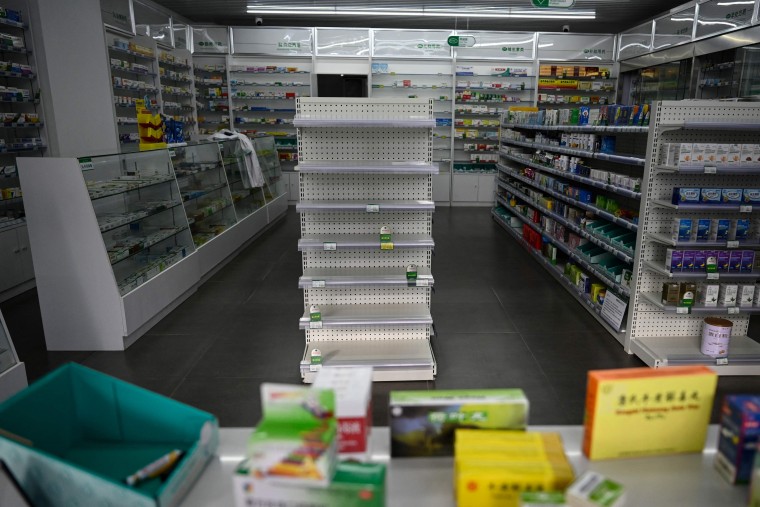HONG KONG — Many people in China have bristled under the weight of “zero Covid” restrictions, strict measures to keep a tight grip on infections while much of the world opened back up.
Now those curbs are suddenly being swept aside in the wake of rare nationwide protests, and the capital of the world’s most populous country appears to be facing a wave of infections as the rapid policy shift presents new challenges ahead of the busy winter travel season.
Downtown Beijing was largely deserted this week as people seemingly stayed home to avoid infections. There are shortages of some medicines as residents stockpile them along with other supplies. Hospitals face a rise in patients and staff catching the virus. And there were social media reports of people panic-buying lemons and peaches after spurious social media trends suggested falsely that they were effective treatments.
In a sign that other major cities are also affected, financial hub Shanghai ordered most of its schools to move classes online Saturday.

It’s difficult to know exactly how bad things are.
China reported 2,157 new symptomatic infections Thursday, but officials have stopped counting asymptomatic cases and halted mandatory testing. Many people now use rapid test kits at home whose results aren’t often registered, and officials have switched from “prevention” to focusing on “treatment.”
Anecdotally, many people in Beijing describe a widespread outbreak.
“My family is OK, but more than half of my colleagues have Covid right now,” Yueying Wang, 22, a university student who interns at a tech company, told NBC News.
James Zimmermann, a lawyer, posted on Twitter earlier this week that 90% of his office was sickened.
“This is not a spike, this is a tsunami,” said Jin Dong-Yan, a professor at the University of Hong Kong who studies viral diseases.Until now, China’s policy has stood in stark contrast to the West, which spent much of the last three years yo-yoing in and out of lockdowns while suffering millions of deaths. Meanwhile, Beijing has tried to maintain its policy of imposing harsh limits on people’s daily lives whenever an outbreak flared.
Although direct comparisons are difficult, officially China has suffered just more than 5,200 deaths — compared with nearly 1.1 million in the United States. But repeatedly locking down parts of the nation of 1.4 billion has also wrought huge internal economic damage, while worsening supply chain problems for the rest of the globe.
It also recently caused social unrest in the form of widespread demonstrations, which appeared to be the catalyst for the abrupt policy change. Some even called for Chinese President Xi Jinping to step down — a level of dissent not seen in decades in a country in which freedom of speech is tightly controlled.
However, the dizzying policy shift has not been met by scenes of liberation, with many residents seemingly deciding to lock themselves down in an apparent bid to shelter from the waves of uncertainty and infections that have coincided with the reopening.

On Wangfujing, a popular pedestrian shopping street in the capital, NBC News witnessed more security guards and police than pedestrians wandering around earlier this week. Tai Taikoo Li, another upscale area, has been virtually empty all week even though restrictions were lifted. And the large, usually thronging Shunyi New World Shopping Mall was nearly empty of customers.
“It used to take me more than two hours to drive to our company’s project location, but now it only takes me about an hour for the 50 kilometer (30 mile) journey,” said Song, a 44-year-old commuter who asked to be only identified by his surname because he worried his state-owned employer would not allow him to speak with the news media. “There are very few people on the roads in Beijing now.”
Whether the lifting of the restrictions was the initial cause of the wave of infections is up for debate.
Dr. Mike Ryan, the emergencies director at the World Health Organization, told a news briefing Wednesday that he believes Chinese officials saw that lockdowns “were not stopping the disease” and “decided strategically that was not the best option anymore.”
But now that wave is underway, many experts are worried that the reopening — and the risk of lots of people becoming infected all at once — has the potential to overwhelm China’s health care system.

The main worry is that millions of Chinese people — almost 1 in 3 over the age of 60, according to official figures — haven’t had a third booster shot, leaving them more exposed to serious illness.
The government has recently ramped up its bid to vaccinate reluctant older people.
And because China has avoided large waves so far, it lacks the immunity through infection that many other countries have obtained as a side product of their massive and deadly waves.
“I’m really worried about how the hospitals and intensive care units are going to hold up with such a large number of infections in a short space of time,” said Ben Cowling, the chair of epidemiology at Hong Kong University. “Most likely the majority of the population will be infected within a fairly short space of time because the only thing that’s going to stop this virus is when everybody’s had it.”
Anticipating a potential shortage of available staff in hospitals as the virus spreads, the Global Times newspaper, the Chinese Communist Party’s bullish mouthpiece, openly suggested that some may be asked to continue working despite being sick to avoid the risk of patients going untreated.
The abrupt lifting of restrictions could result in over a million deaths through 2023, according to new projections from the U.S.-based Institute of Health Metrics and Evaluation, which has been relied on by governments and companies throughout the pandemic.

China’s health care system tends to be overreliant on hospitals, with people often seeking care there even for less severe illnesses. Cold and flu medicines are now difficult to come by in pharmacies, according to The Associated Press. The National Health Commission said on Friday that it was building up stocks of essential drugs as well as ventilators.
Meanwhile, on Weibo, a Chinese social media platform, the term “Hubei Lemon” was trending after users recommended lemon or lemon-flavored products to help soothe the sore throats of patients infected with Covid-19. Videos of people seemingly panic-buying and hoarding lemons along with Covid-related supplies went viral.
The AP reported there was also a run on canned yellow peaches, which are seen in China as particularly nutritious, leading one of the largest producers to post a message on social media warning people that the fruit was not a medicine, and that there was plenty of supply.